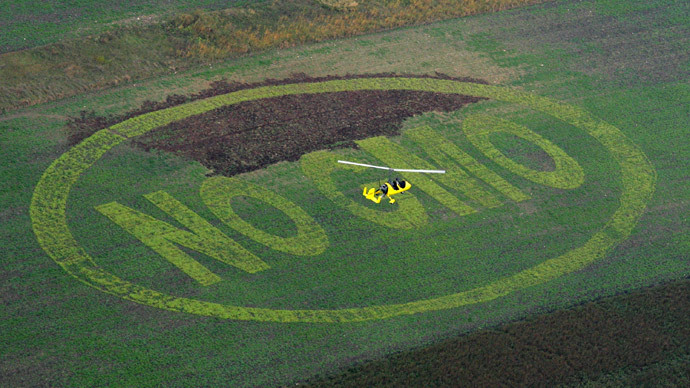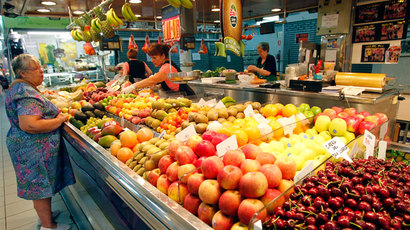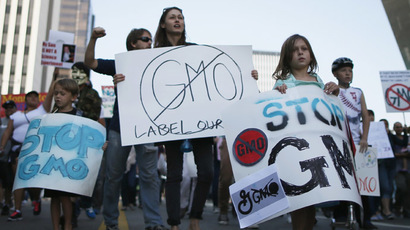Koch ally to introduce Monsanto-backed bill to bar state GMO labeling laws

Rep. Mike Pompeo will introduce legislation backed by powerful trade groups to prevent states from passing laws requiring the labeling of genetically-modified foods, according to reports. The bill is linked to biotech giant Monsanto and Koch Industries.
Pompeo will offer the bill in the US House before Congress leaves for Easter recess later this month, The Hill newspaper reported, citing industry sources. Politico also reported on the impending proposal. Pompeo’s office would not comment on the congressman’s intentions for a labeling restriction.
The bill includes a “prohibition against mandatory labeling,” according to The Hill, echoing powerful interest groups that have already declared war against such “right to know” labeling laws around the nation.
It was revealed in recent months that powerful farming and biotechnology interest groups like Monsanto were joining forces – under the name 'Coalition for Safe Affordable Food' – to push a federal voluntary labeling standard for food made with genetically-modified organisms (GMOs) in an effort to stem the tide of state legislation seeking to mandate labeling.
In recent years, voters in states such as California and Washington have narrowly defeated ballot initiatives proposing mandatory GMO labeling, though not without dragging members of the new Coalition into expensive campaigns to defeat the measures. Many other states are now considering their own proposals to label GMO food.
A top member of the Coalition – the Grocery Manufacturers Association (GMA), a major food industry lobbying group – raised and spent the bulk of the overall $22 million that opponents of labeling sank into defeating Washington State’s ballot initiative on GMO labeling last year. That total number was three times the amount that proponents of labeling spent in the state. GMA was joined in its effort by allies such as biotech giants Monsanto, Bayer, and DuPont.
The Coalition said in February that it would seek to empower the US Food and Drug Administration (FDA) “to establish federal standards for companies that want to voluntarily label their product for the absence-of or presence-of GMO food ingredients.” In addition, the Coalition proposes the FDA mandate labels for GMO food or ingredients that the agency deems a “health, safety or nutrition issue,” though no consumables currently fall in such a category.
“The legislation we’re proposing would preclude state legislation that conflicts with the federal standards,” GMA president Pamela Bailey said of the Coalition’s aim, The Hill reported.
Federal standards like the ones the Coalition has called for are necessary to “guard against a costly, unnecessary and inefficient state-by-state system,” a November memo among the GMA-led industry groups said.
Pompeo, a Republican from Kansas, has numerous ties to Charles and David Koch, heads of the formidable multinational corporation Koch Industries.
Pompeo founded Thayer Aerospace (now Nex-Tech Aerospace) with investment funds from Koch Industries. He then was named president of Sentry International, an oilfield equipment company that partners with Koch Industries.
In his initial run for Congress in 2010, Pompeo received more money from the Kochs than any other politician. Once in the House, the congressman introduced bills sympathetic to Koch Industries, The Washington Post reported.
Koch Industries’ subsidiary, Georgia-Pacific, is also a member of the Grocery Manufacturers Association.
“GMA’s selection of Congressman Pompeo as their champion shows how extreme the proposal really is,”said Colin O’Neil, director of government affairs for the Center for Food Safety. “Selecting Pompeo creates an unholy alliance between Monsanto and Koch Industries, two of the most reviled corporations in America.”
The vast majority of conventional processed foods in the US are made with genetically-modified ingredients. Around 93 percent of all soybean crops planted in the US last year involved genetically-modified, herbicide-tolerant (HT) variants, the USDA has acknowledged. HT corn and HT cotton constituted about 85 and 82 percent of total acreage, respectively.
“HT crops are able to tolerate certain highly effective herbicides, such as glyphosate, allowing adopters of these varieties to control pervasive weeds more effectively,”reads an excerpt from a recent US Department of Agriculture report.
As those weed-killers are dumped into more and more fields containing HT crops, however, USDA experts say it could have a major, as yet uncertain impact on the environment.
Science is also inconclusive on whether genetically-engineered products can cause long-term harm to human health. At least, that is the consensus held by the several dozen countries which have banned or severely restricted their use worldwide.
“While risk assessments are conducted as part of GE product approval, the data are generally supplied by the company seeking approval, and GE companies use their patent rights to exercise tight control over research on their products,” the Union of Concerned Scientists said of GMOs. “In short, there is a lot we don't know about the risks of GE - which is no reason for panic, but a good reason for caution.”
GMO crops are now grown in 28 countries, or on 12 percent of the world's arable land, with the acreage doubling every five years. However, in the European Union, only two GMO varieties (compared to 96 in the USA) have so far been licensed for commercial harvesting.














